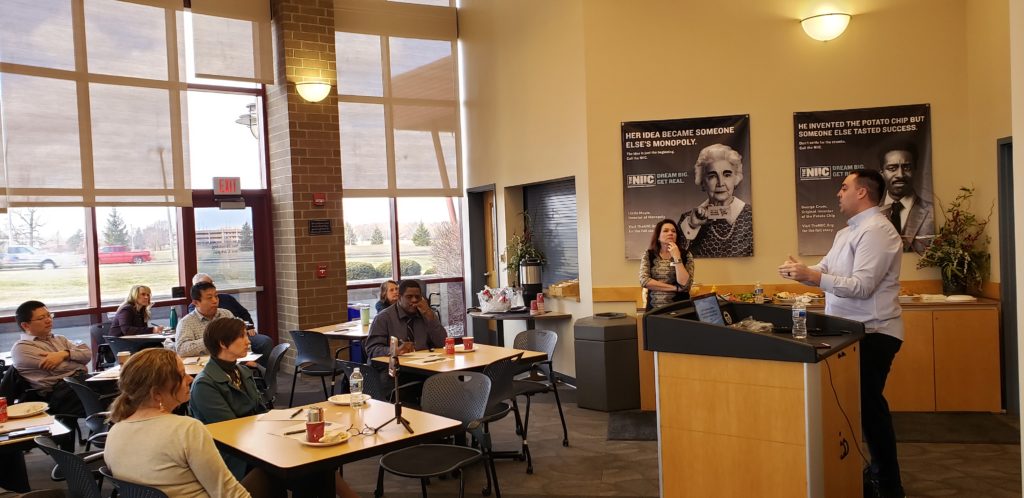03.04.20
Fixing fragmented follow-up care
Jessica Carender, Partner Engagement Manager, The NIIC

Olio CEO’s five steps for launching a health-tech startup
Ben Forrest, founder and CEO of Olio, offered insights to healthcare entrepreneurs at Connected Health Lab Third Thursday Connections event at The NIIC in Fort Wayne, Ind. He candidly shared the rewards and challenges of launching a digital healthcare startup.
His presentation was very timely. Healthcare technology is a growing sector of the regional economy. It’s expected there will be 75 billion connected IOT devices by 2025. Connected health and the Internet of Things have tremendous potential to improve public health and create business opportunities in our regional economy.
Forrest explained that technological innovations are solving tough challenges inpatient care. “Today, after patients leave the hospital, follow-up care is very fragmented. One hospital may discharge a patient with a referral to go to a nursing home, rehab center, or home care—with more than a hundred to choose from. It’s a complex problem that requires a technological solution,” Forrest said. “We saw an opportunity to connect doctors, nurses, and post-acute care providers in real-time.”
1. Ideation
Before launching Olio, Forrest owned his own business as an orthopedic device distributor. “I had about 20 employees and my role afforded me enough time to sit back and think about problems that needed to be solved, problems that could be solved, and new markets that could be developed,” Forrest said. “I was also fortunate to be around a lot of influential people — orthopedic surgeons, the guys on the billboards — and I had an ecosystem for asking questions, testing ideas, and solving problems.”
Forrest tried his hand at consulting and was immediately successful. However, he soon discovered that the challenges facing post-acute care were so large and complex and required a technological solution. “It’s not one guy talking about the problem, connecting people, or telling them what to do. It quickly became, ‘how can we use technology to solve this problem and bring people together?’”
The solution he proposed was Olio, a software platform that connects hospitals, doctors, nurses, and post-acute caregivers. In real-time, a patient’s status and recovery progress can be reported to their entire healthcare team.
2. Capital
The innovative concept attracted $5.0 million in angel investment, mostly from individual doctors who saw an opportunity to improve patient outcomes.
Forrest expressed gratitude for the early-stage investment his company has received, observing that start-up capital fuels business growth.
“With a start-up, you have to go as fast as humanly possible in every decision you make — and you have to be okay with making really crappy decisions sometimes. And part of that is you need to have fuel to make decisions, right? You can’t move forward if you don’t have any cash.”
3. Developing a Support System
“But even before that, you need emotional capital,” Forrest said. “You need people who believe in you. People who will let you do something crazy, like sell a successful business to follow a dream. You need people who will buy into your dream.”
4. Workspace
Olio quickly outgrew its small rented office. The team of 18 employees — mostly software engineers — moved into a repurposed church in the Broadripple neighborhood of Indianapolis. Forrest said the workspace could eventually house 80 employees.
“We use the cool old building and the neighborhood to attract talent. They like being around coffee shops and bars and restaurants and walkable stuff. With startups, your culture is everything.”
5. Talent & Culture
Forrest acknowledged that the “alpha” tech companies are mostly located in downtown Indianapolis. With Salesforce’s purchase of ExactTarget, Indianapolis has earned some buzz for being a regional hub for software-as-a-service (SAAS) developers.
“With a startup, your culture is what enables you to invite top talent to join your team, even if you’re a smaller, younger company. People will want to become a part of what you’re doing if you can offer them a cool place to work and the chance to solve big problems — the opportunity to believe in what they’re doing.”
For more information about NIIC Connected Health Lab, visit https://niic.net/iot/.

